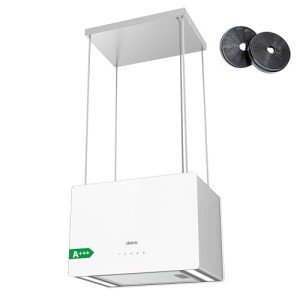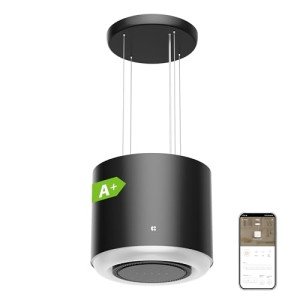Island Extractors: A Comprehensive Guide to a Unique Industry
In the world of extraction markets, couple of sectors record the creativity as vividly as that of island extractors. These specialized entities focus on the extraction of valuable resources, both sustainable and non-renewable, from island environments. This short article explores the multifaceted world of island extractors, discussing their operations, environmental impacts, and the future of this specific niche market.
Understanding Island Extraction
Island extractors are companies or people that take part in the extraction of natural resources found on islands. This extraction can consist of a variety of materials, such as minerals, fossil fuels, island Cooker hoods 60cm and even marine resources. Provided the special environments discovered on islands, the extraction procedure can present both chances and inherent difficulties.

Categories of Island Extraction
island chimney hood extraction can usually be categorized into several categories:
| Category | Description | Examples |
|---|---|---|
| Mineral Extraction | The elimination of minerals from the earth | Kaolin, Bauxite, Iron Ore |
| Nonrenewable Fuel Source Extraction | Extraction of fuels formed from natural matter over millennia | Oil, Natural Gas |
| Marine Resource Extraction | Collecting resources from oceanic environments | Fish, Seaweed, Shellfish |
| Sustainable Resource Extraction | Extraction of sustainable resources | Timber, Freshwater |
The Process of Island Extraction
The extraction procedure itself can differ substantially based on the resource in question. The procedures for drawing out oil diametrically differ from those for collecting seafood.
Actions in the Extraction Process
- Exploration: This stage involves geological studies and initial research studies to assess the potential of the resource.
- Regulations Compliance: Compliance with regional and international ecological laws is crucial to make sure sustainable practices.
- Extraction: This includes drilling for oil or mining for minerals, and can cause significant disturbance to regional communities if not managed correctly.
- Transportation: Extracted resources usually need transport back to the mainland or other markets, typically involving making use of ships and barges.
- Post-Extraction Restoration: Efforts to bring back the environment post-extraction are vital to mitigate lasting effects.
Environmental Impact of Island Extraction
Offered the fragile nature of cooker hood island ecosystems, the environmental impact of extraction activities can be considerable.
Key Environmental Concerns
- Environment Destruction: The physical elimination of landscapes can ravage local plants and fauna.
- Pollution: Resource extraction can present toxins, causing ocean acidification, water contamination, and air quality deterioration.
- Coastal Erosion: Activities can exacerbate seaside disintegration, changing the natural landscape and impacting local neighborhoods.
- Biodiversity Loss: Extractors typically disrupt regional communities, placing native species at threat.
Mitigation Measures
To counteract these impacts, island extractors are increasingly adopting sustainable practices which consist of:
- Implementing stricter environmental regulations
- Utilizing technology for safer extraction procedures
- Carrying out thorough environmental impact assessments (EIA)
- Engaging with local communities throughout preparation and operation stages
The Future of Island Extraction
As worldwide need continues to increase for natural resources, the future of island extractors appears appealing yet intricate. A number of factors will shape the trajectory of this market in coming years:
- Technological Advancements: Innovations in extraction innovation might result in more efficient and less ecologically disruptive methods.
- Regulatory Changes: As climate change ends up being an ever-pressing issue, more stringent regulations may redefine extraction practices, prioritizing sustainability.
- Pressure from Environmental Groups: Increased advocacy for the defense of biodiversity and environments can influence operational procedures.
- Shift towards Renewable Resources: A growing emphasis on renewable resource options may alter the focus from non-renewable extraction to sustainable practices.
Regularly Asked Questions
What resources are frequently extracted from islands?
Typical resources drawn out from islands include minerals, fossil fuels, lumber, freshwater, and marine resources such as fish and seaweed.
How do island extractors guarantee sustainability?
island Cooker Hoods 60cm extractors can guarantee sustainability by sticking to environmental guidelines, integrating technology that decreases impact, and bring back environments post-extraction.
What are the major challenges dealt with by island extractors?
Obstacles consist of compliance with policies, handling environmental effects, logistical issues connected to transport, and engaging with local communities affected by extraction.
Are there any notable island extraction jobs?
Yes, different jobs exist worldwide, consisting of mineral mining in the Caribbean, oil drilling in the North Sea, and sustainable fish farming efforts in Southeast Asia.
The world of island vent hood extractors is a complex interplay between economic opportunity and environmental duty. As this industry progresses, the challenge will be to stabilize resource extraction with the requirement to safeguard delicate island communities. By embracing sustainable practices and engaging with local neighborhoods, island extractors can forge a course that respects both nature and industry, guaranteeing that these special environments are protected for generations to come.
 📌 20 Questions You Must Always To Ask About Island Extractors Before You Buy Island Extractors
📌 20 Questions You Must Always To Ask About Island Extractors Before You Buy Island Extractors

